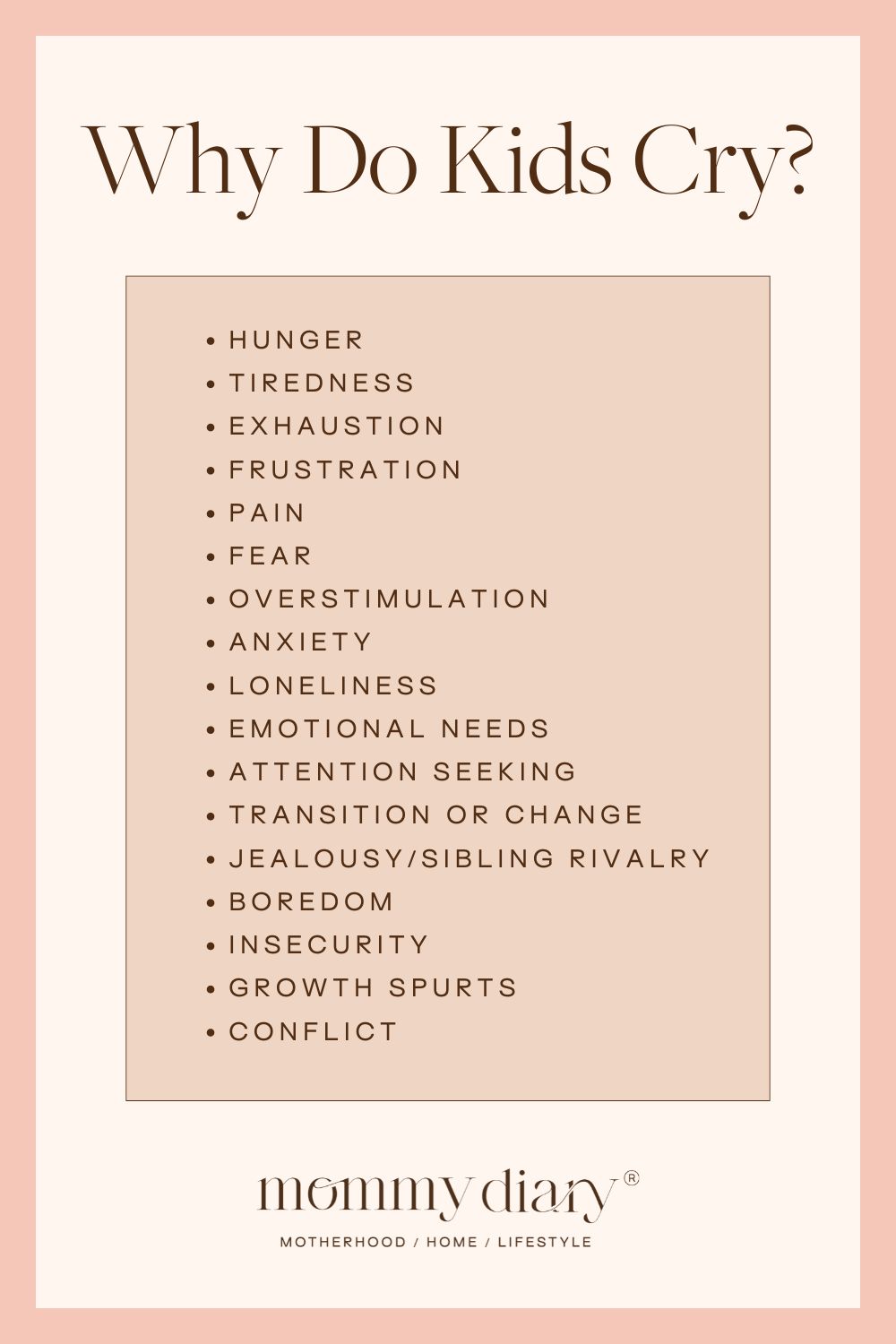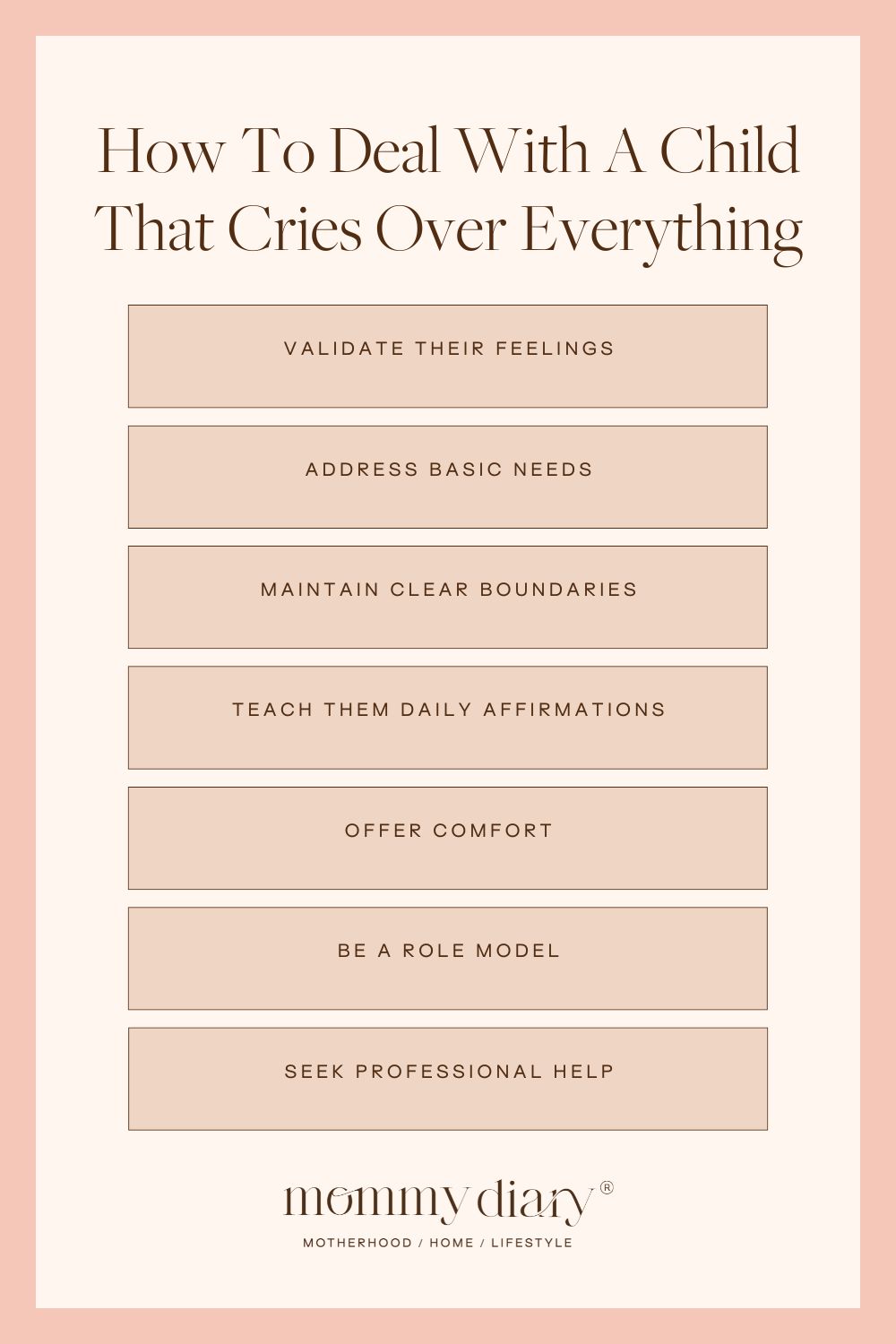
If there’s one thing I know for sure, it’s that parenting is remarkably rewarding, yet considerably challenging at the same time. As a mom of four, I also know every child is different and learning to work with each of their personalities can help you connect with them better. This makes it much easier to know what steps to take to de-escalate and help children through hard times when their emotions feel bigger than their little minds can handle.
Of course, this is easier said than done, especially when your child seems to cry more than others. Constant crying and whining can create an incredibly frustrating situation for both the child and their parents or caregivers, making it hard to stay calm. It can make every situation feel ten times harder. So, today, I’m sharing practical strategies to help you deal with a child who seems to cry over everything. Let’s dive right in!
How To Deal With A Child That Cries Over Everything
Understanding why children cry is important for parents and caregivers alike. It goes so far beyond communication. It’s a window to their inner emotions. By figuring out the reasons behind their tears, whether due to fear, anxiety, frustration, exhaustion, or simply a need for comfort, you can better respond with empathy or support.
This understanding can help to soothe the immediate distress and build a foundation of trust and emotional resilience for children. As a mom who has dealt with anxiety myself, as well as big feelings, I am aware that for our children, it’s even more isolating. Which is why I think it’s so important to identify, understand, and help them through it.

Why Do Kids Cry: Reasons Your Child Might Be Crying
This list covers a wide range of potential triggers for children’s tears. Understanding these reasons can empower you and help you respond with empathy and patience.
- Hunger
- Tiredness
- Exhaustion
- Frustration
- Pain
- Fear
- Overstimulation
- Anxiety
- Loneliness
- Emotional Needs
- Attention Seeking
- Transition or Change
- Jealousy/Sibling Rivalry
- Boredom
- Insecurity
- Growth Spurts
- Conflict
How To Deal With A Child Who Cries Over Everything
Validate Their Feelings
It is so important that you firstly acknowledge and validate your child’s feelings. To them, this problem is the end of the world. After all, they don’t have adult problems like we do.
Even if the reason for their tears seems trivial, support them through it and empathize with them. Try to use phrases like “I understand you’re feeling sad right now” and “it’s okay for you to be upset.” Allow them to feel their emotions.
Address Basic Needs
Make sure that your child’s basic needs are being met before you become confused about their tears. Sometimes, excessive crying can start because of hunger, fatigue, discomfort, or illness. By addressing these basic needs, you can often prevent any unnecessary tears.
Maintain Clear Boundaries
With older children, try to establish consistent rules and boundaries for their behavior. This helps children to understand what’s expected of them and reduces feelings of anxiety about unpredictable situations. By being consistent with these boundaries, you provide a sense of security and stability for your little one.

Teach Them Daily Affirmations
Daily affirmations for kids are a great way to help children understand their emotions and navigate tough times. Encouraging positive self-talk and affirmations regularly can boost self-esteem and resilience. Help your child to develop phrases like “I can handle this” and “I am brave.”
Offer Comfort
Comfort is the key to creating a child with great emotional regulation. When you provide comfort through physical touch, hugs, or soothing words, you reassure your child that you are there for them. While doing this, you can offer your little one strategies to help them cope with whatever is upsetting them.
Be A Role Model
The way children develop depends very much on their environment. When you demonstrate healthy ways to manage your emotions, your children will see this and mirror it. Show them how to express their feelings constructively, such as taking deep breaths and talking about their feelings.
Seek Professional Help
If crying episodes persist despite your best efforts, it may be a good idea to seek professional help from a pediatrician or child psychologist. Persistent crying over seemingly small issues can be a sign of underlying emotional or developmental challenges that need professional assessment or support. Don’t be embarrassed about seeking professional support. It isn’t weak to reach out and get your little one some help with their big emotions.
Empathize and support your child with these tips.
All of the strategies above help to foster emotional regulation and resilience in children. With these tips, you can create a supportive environment where children feel secure and confident in managing their emotions. It’s all about conscious parenting and being aware of your own emotions when dealing with theirs.
I would love to hear about ways you deal with your children’s emotions. Do you have any tips you’d like to share? Let me know in the comments below! And if you’re a little stuck on how to deal with it, I am always here to help. For more helpful tips, head on over to the Mommy Diary blog.

